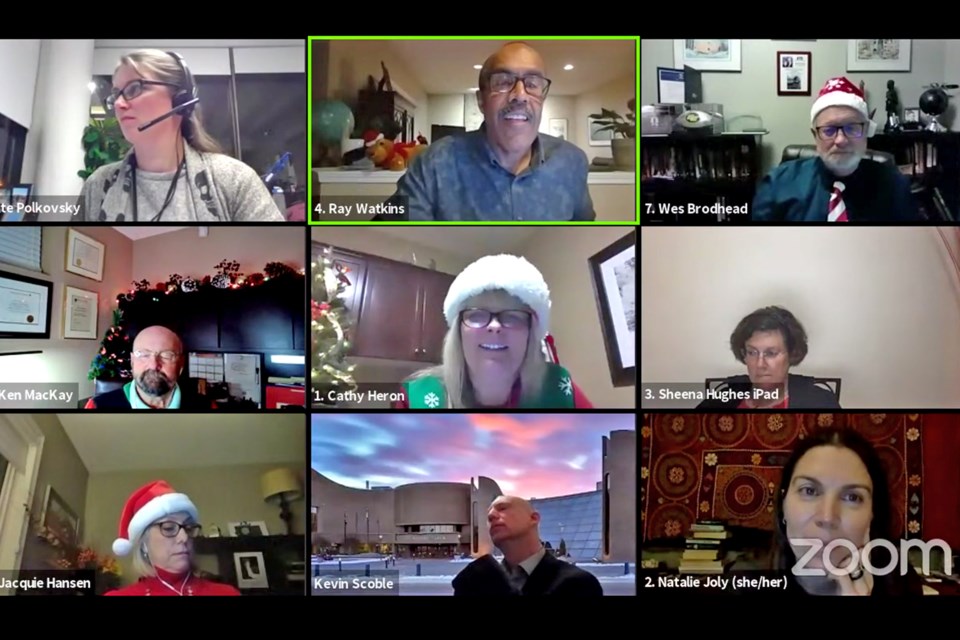During the last council meeting of the year, St. Albert city council approved spending $75,000 on a study exploring whether a municipal energy corporation could be successful.
On Monday, council debated Coun. Ray Watkins's motion to direct staff to provide a feasibility report on establishing an energy corporation, including recommendations for council to consider, by June 30. Ernst & Young would prepare the report as part of its ongoing operational and fiscal review of the city.
A municipal energy corporation could include a proposed solar farm, waste-to-energy plant and other possible energy ventures. Chief administrative officer Kevin Scoble told councillors there are geothermal opportunities available locally, as well as opportunities in hydrogen, among others.
The feasibility report would include an evaluation of net income projections, energy generation and marketing opportunities, financing methods, regional collaboration and integration opportunities in new developments. It would also include the process, timelines and costs to establish the energy corporation.
Watkins’ motion came about a year after council voted against taking next steps toward creating a municipal utility corporation (MUC) last December. At the time, councillors Ken MacKay, Watkins, Jacquie Hansen and Sheena Hughes voted against it, citing overwhelming public pushback against the plan.
But with other revenue sources "drying up," Watkins said the city can't wait any longer to find new ways to make money and address the city's deficit."We have a long-term sustainability problem as evidenced by our $256-million-dollar deficit alone in our 10-year capital plan ... On (repair, maintain, replace projects), we aren't even treading water – we're slowly sinking to the bottom," Watkins said.
In a background report on Watkins' motion, administration said managing expenses won't be enough by itself to fully address the city's looming deficit.
"We better throw out a life preserver, because this is a time bomb waiting to hit our city's finances and ultimately, the taxpayer," Watkins said.
Instead of rolling several utilities into one corporation like the last proposal, Watkins said this study would explore whether focusing on clean energy would be a more successful venture.
Low-carbon, natural resource products are "all poised for growth going forward" both in Canada and the Edmonton region, according to administration's backgrounder, which pointed to private sector investments like Suncor's $75 million stake in Enerkem, a waste-to-biofuels and chemicals producer. During the council meeting, Scoble said finding private partnerships would be "fundamental" to the corporation's operations.
Debt for those projects, like the $30-million in borrowing costs needed to get a proposed solar farm in the Badger Lands up and running, would be taken off municipal budget books and placed on the shoulders of the municipal energy corporation instead.
"Any liability associated with that is kept within the energy corporation," Watkins told the Gazette. Additional debt for large energy projects like this wouldn't be tacked onto the city's debt, which can only go up to a certain limit by law, he said. "There are benefits of being a limited company at an arms length to the city."
David Niebach, chair of the city's economic sustainability advisory board, said the ESAB wrote a letter in support of the city moving ahead with the feasibility study.
"We're always in support of finding additional revenue streams to help the city manage its budgets," Niebach said.
However, the corporation still needs to make enough revenue to pay off its expenses. If the corporation can't do that, the city could be left to foot the bill.
In Chestermere, the city’s council decided to take back control of Chestermere Utilities Inc. (CUI) in 2018 after the arms-length utility corporation amassed nearly $35 million in debt over its seven years in operation, partially because the CUI had undercharged its customers for three years. The CUI continued to operate as a shell company just to hold the debt it had accrued – dissolving it completely would have pushed Chestermere's debt close to the municipal limit.
Reflecting on the lack of detailed information in last year's $100,000 MUC business case, Coun. Ken MacKay said he was worried council was "out of step" by moving forward with a study before hearing the rest of Ernst & Young's ongoing review.
"We've got the 'ready, fire, aim' approach," MacKay said. "I'm caught in between right now."
With neither the solar farm nor waste-to-energy pilot in operation, Coun. Sheena Hughes questioned whether the city should be spending money on a energy corporation without seeing how these projects perform first.
"The public has been very clear on their position on doing an MUC, regardless of the energy source," Hughes said. "Personally, I just feel uncomfortable going down this rabbit hole again."
Coun. Jacquie Hansen said the city has to address its long-term sustainability, but she would be looking for a level of detail in this feasibility study that would answer more questions for residents this time around.
The motion passed in a 6-1 vote, with Coun. Sheena Hughes against.
Should the feasibility study evolve into a business plan, Scoble said the decision on a future municipal energy corporation would likely fall on the shoulders of the next council.




